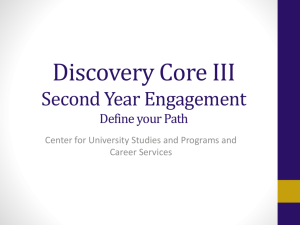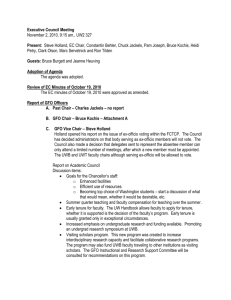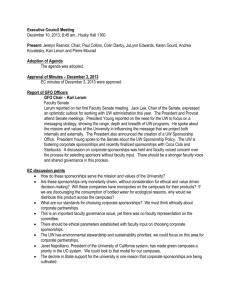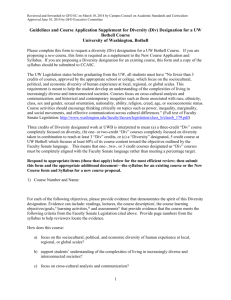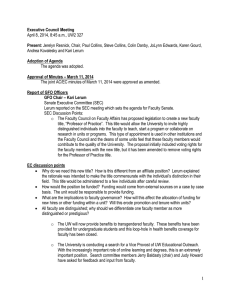Executive Council Meeting January 13, 2015, 8:45 a.m., UW2 327
advertisement
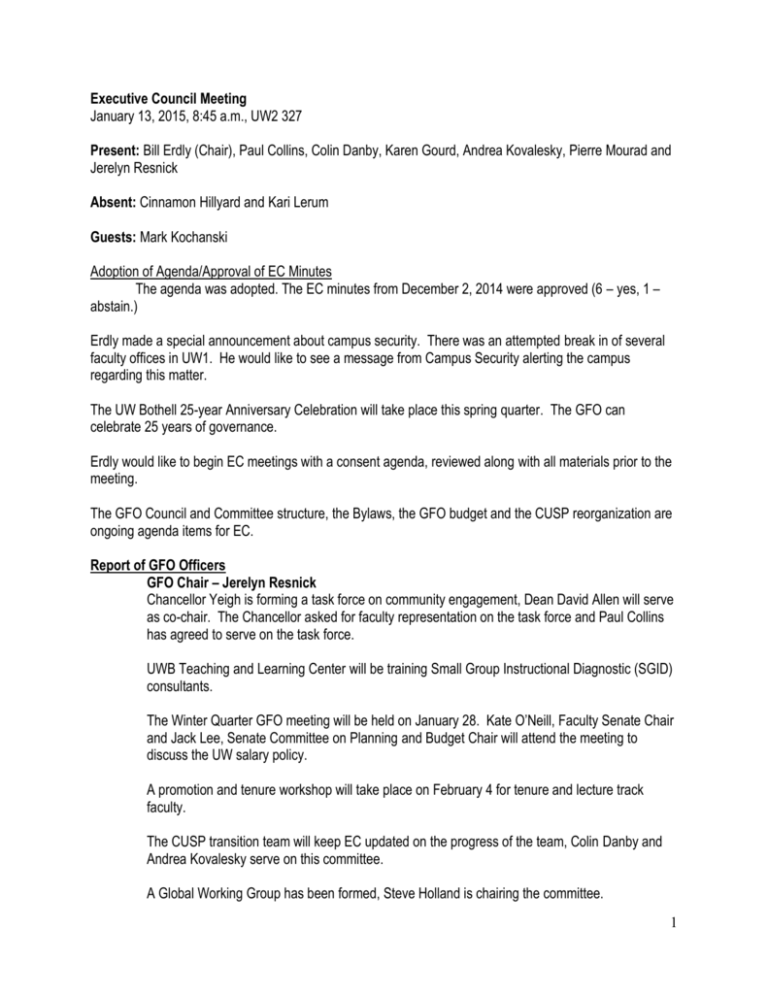
Executive Council Meeting January 13, 2015, 8:45 a.m., UW2 327 Present: Bill Erdly (Chair), Paul Collins, Colin Danby, Karen Gourd, Andrea Kovalesky, Pierre Mourad and Jerelyn Resnick Absent: Cinnamon Hillyard and Kari Lerum Guests: Mark Kochanski Adoption of Agenda/Approval of EC Minutes The agenda was adopted. The EC minutes from December 2, 2014 were approved (6 – yes, 1 – abstain.) Erdly made a special announcement about campus security. There was an attempted break in of several faculty offices in UW1. He would like to see a message from Campus Security alerting the campus regarding this matter. The UW Bothell 25-year Anniversary Celebration will take place this spring quarter. The GFO can celebrate 25 years of governance. Erdly would like to begin EC meetings with a consent agenda, reviewed along with all materials prior to the meeting. The GFO Council and Committee structure, the Bylaws, the GFO budget and the CUSP reorganization are ongoing agenda items for EC. Report of GFO Officers GFO Chair – Jerelyn Resnick Chancellor Yeigh is forming a task force on community engagement, Dean David Allen will serve as co-chair. The Chancellor asked for faculty representation on the task force and Paul Collins has agreed to serve on the task force. UWB Teaching and Learning Center will be training Small Group Instructional Diagnostic (SGID) consultants. The Winter Quarter GFO meeting will be held on January 28. Kate O’Neill, Faculty Senate Chair and Jack Lee, Senate Committee on Planning and Budget Chair will attend the meeting to discuss the UW salary policy. A promotion and tenure workshop will take place on February 4 for tenure and lecture track faculty. The CUSP transition team will keep EC updated on the progress of the team, Colin Danby and Andrea Kovalesky serve on this committee. A Global Working Group has been formed, Steve Holland is chairing the committee. 1 A large percentage of UWB native students speak a language other than English at home. We cannot assume that only international students have English as an additional language, many native students also use English as a second language. The legislative session has begun in Olympia. Resnick attended the Senate Executive Committee (SEC), President Young spoke to the Committee about the UW budget. Two UWS buildings were listed as priorities on the budget, no UWB buildings were on the top of the list. The President also spoke of maintaining academic quality with future growth at UWB and UWT. Cascadia Community College is now Cascadia College and WSU is hoping to establish a presence in Everett. A discussion on language in the Faculty Code for the promotion of part-time Senior Lecturer to part-time Principle Lecturer was held. . GFO Vice Chair – Bill Erdly UWB updates: VCAA Jeffords contacted Erdly and Resnick concerning an Honors Program at UWB. EC held discussions last year on this matter, although no action was taken. More information is needed and further EC consultation with Linda Watts will be requested. Erdly asked if any EC representative would be interested in attending the legislative session in Olympia to meet with legislators and represent the interests of UWB and promote the campus. Pierre Mourad volunteered to go to Olympia as a faculty representative along with the EC Chair/Vice Chair. New Business A. Interactive Media Design (IMD) 1503 Change Proposal Review- Mark Kochanski Kochanski opened discussion on the change proposal for the Interactive Media Design (IMD). The IMD major was originally designed as a fee-based degree, though never implemented as fee-based. Experiences within the first year, consultation and a faculty retreat over the summer with host Schools, IAS and STEM/CSS identified issues and resulted in the current State funded program. The IMD degree will be co-administered by IAS, STEM/CSS with a Faculty Oversight Committee (AOC). The budget is shared by the Schools administering the program, new funding has be allocated for three faculty hires, two assistant professors and a Studio Director. Curricular development is managed through the AOC. Electives have replaced the former core, use of courses within the Schools will allow students to take more courses across the campus and allows non-IMD students to take courses within the IMD program. EC discussion points Who is currently teaching in this program? Kochanski stated that he is teaching, Wanda Gregory, Carrie Bodle and Jason Pace are currently teaching the studio practicum sequence this year. Future teaching assignments will be overseen by the faculty coordinator of IMD, AOC in consultation with IAS, STEM and CSS. There are two full cohorts, a junior and senior level cohort with 30 students in each. 2 Concerns: Core courses were originally more technical, these courses are not as technical as originally proposed, how does this reflect academically on the program? The free form selection of electives could result in an overlap of content in the curriculum and allow students to repeat course content. There is only one staff advisor currently for student advising. The program will evolve over time and data gathering will inform future changes in required elective credits. It is designed not to place and excessive burden on any course or unit and a range of courses can satisfy pre-requisites. We can make incremental changes over time with electives in Business, Educational Studies as well as IAS and STEM. How does IMD and Media and Communication Studies (MCS) differ? They are pedagogically and philosophically different, this has a STEM approach. The studio form, web programming and other required pre-requisites are distinctive. How competencies are met also distinguishes the IMD program from MCS. Elimination of the program STEM-oriented core is a different model than originally proposed. How will theories and competencies be achieved? IMD prepares students for technical design jobs, this focus has not changed. Students will demonstrate through projects that they are ready for industry positions. Will internships be part of the program? Integrated studio projects built into the program will serve as a capstone for students to gain experience working with stakeholders. How will the program fund the infrastructure of the program, studios, etc? Course fees and the same campus resources as other programs for media and digital space will fund the program. How will FTE be determined? A multi-programmatic degree may be difficult to operationalize concerning FTE count. The university structure does not facilitate this model. For enrollment purposes, what percentage will each School take, how will FTEs be separated? This issue should be discussed at the university level of governance. EC motion Collins moved to pass the motion: “The EC approves the Interactive Media Design (IMD) 1503 Change Proposal”. The motion was seconded and no discussion followed. Erdly called the question on the original motion. Hearing no objection, he called for a vote on it. By show of hands, the motion carried unanimously. B. GFO Bylaws Update and Committee Revision Planning Process Erdly opened discussion on the current structure of the GFO, the role and authority of the EC in strategic planning and budgetary decision-making. The GFO Bylaws currently are structured with three Council and one Committee: Executive Council Campus Council on Promotion Tenure and Faculty Affairs Campus Council on Academic Standards and Curriculum 3 Instructional and Research Support Committee (this committee has been inactivated). The Bylaws need to be updated to reflect the campus structure and revised to reflect changes in governance structure. A faculty vote is required to amend the Bylaws. The EC has approved creation of a GFO Budget and Planning Council and an Assessment and Learning Council. These Councils will support campus level shared governance and give faculty voice to strategic planning at UWB. EC discussion points Schools are discussing decentralizing the curricular review and approval process. Is it time to recognize School based structure for this role? The CCASC could be involved in policy level decision making. Some Schools would also like to move promotion and tenure review to the School level. The Councils would be faculty-driven, administrators would serve in an ex-officio capacity, without vote. We need to assess whether we need campus-level review of curriculum and in promotion and tenure. It may serve us to have this level of overview in these areas. There are quality control functions that these Councils serve that affect more than individual units. Will changing the structure be value added? Our current structure was a model created 18 years ago, we need to revisit the Bylaws and determine how governance would best serve the current campus structure and complexities. Decisions are often made at the institutional level without substantive faculty input. How are decisions made about administrative positions? There is a proliferation of Vice Chancellor positions at this campus, who decides what title to award a job position? There is no faculty input on these important issues impacting resources. Where is the narrative organizational chart that the EC has requested? Enrollment management is another area for strong shared governance. Short and long term strategic planning will shape all of our futures and the EC should be actively engaged in these discussions. The GFO Campus Council on Budget and Planning will provide an effective governance structure in budgetary decision making. It may be beneficial to have GFO Chairs serve a 3-year term so that they can continue to serve on Councils. Clarification on the roles and responsibilities of Councils is needed, the CCPTFA and the CCASC both report to the EC. Some promotion requirements have changed over time and there is not adequate communication with the faculty on these critical areas. The CCTFA is an advisory body to the VCAA. Action plan: The EC will invite the Chairs of the CCASC and the CCPTFA to meet to discuss the roles and responsibilities of each Council. The EC will invite Professor Linda Watts to discuss assessment and learning and an Honors Program at UWB, a program previously reviewed by the EC. A brief discussion on the Division of Enrollment Management (DEM) and the process for school admissions criteria to be managed by the Office of Admissions was held. The process will centralize the admissions process for transfer students. Each School/Division/Degree at UWB will make a decision independently to adopt this process or retain responsibility for transfer 4 student admission into their programs. The EC will gather input from the Schools and ask that the Schools draft a letter stating their decision on this matter by February 1. Reports from Program Representatives – no reports A. Business – Collins B. CUSP – Danby C. Educational Studies – Gourd D. Interdisciplinary Arts & Sciences – Hillyard E. Nursing and Health Studies – Kovalesky F. STEM – Mourad Good of the Order Meeting adjourned at 10:50 am Minutes submitted by Barbara Van Sant The next meeting will be January 27, 2015 5
